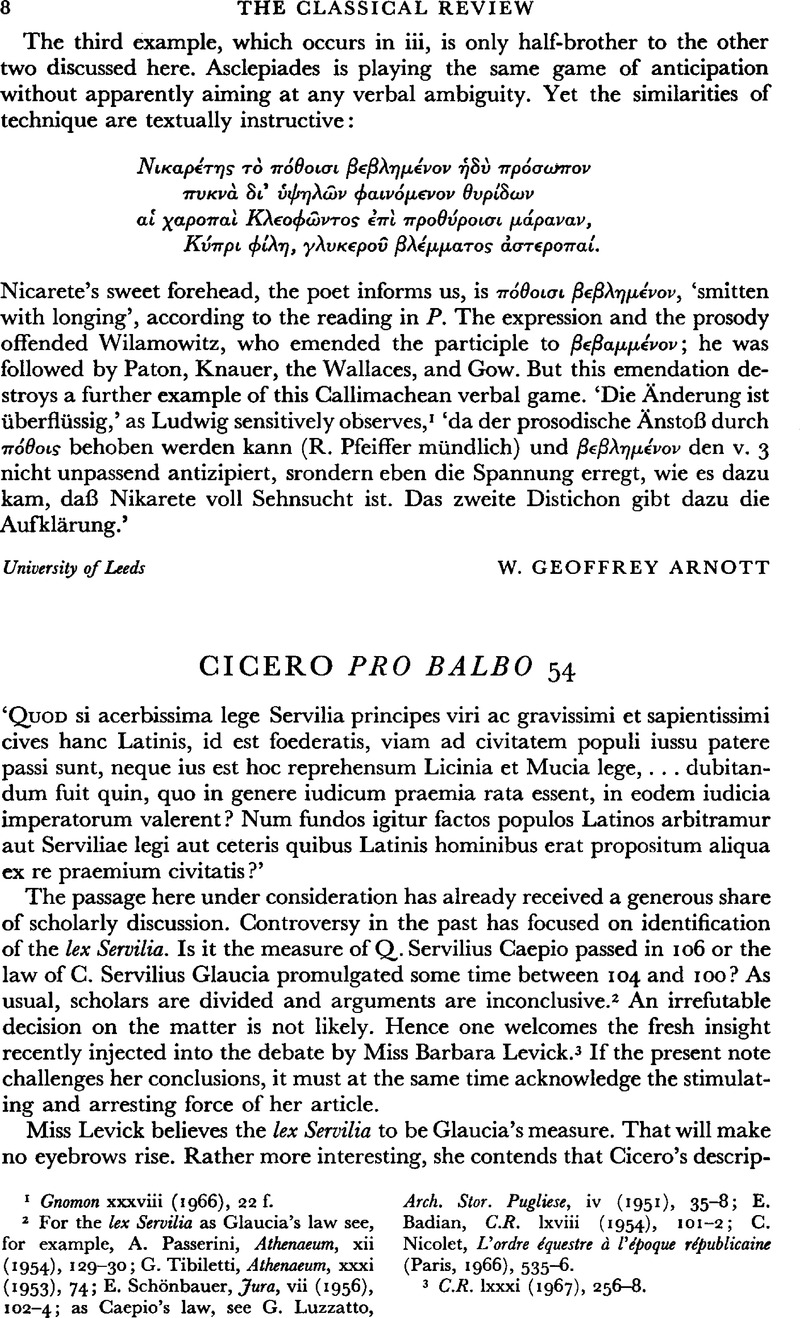Article contents
Cicero Pro Balbo 54
Published online by Cambridge University Press: 27 February 2009
Abstract

- Type
- Review Article
- Information
- Copyright
- Copyright © The Classical Association 1969
References
page 8 note 2 For the lex Servilia as Glaucia's law see, for example, Passerini, A., Athenaeum, xii (1954), 129–130Google Scholar; Tibiletti, G., Athenaeum, xxxi (1953), 74Google Scholar; Schönbauer, E., Jura, vii (1956), 102–104Google Scholar; as Caepio's law, see Luzzatto, G., Arch. Stor. Pugliese, iv (1951), 35–38Google Scholar; Badian, E., C.R. lxviii (1954), 101–112Google Scholar; Nicolet, C., L'ordre équestre à l'époque républicaine (Paris, 1966), 535–536.Google Scholar
page 8 note 3 C.R. lxxxi (1967), 256–258.Google Scholar
page 10 note 1 Cic. apud Asc. 67, Clark; also Schol. Bob. 129, Stangl.
page 10 note 2 Sources in Broughton, , M.R.R. ii. 11Google Scholar; see Husband, R. W., C.P. xi (1916), 321–323Google Scholar; Gabba, E., Athenaeum, xxxi (1953), 260–262.Google Scholar
page 10 note 3 Cic. Inv. ii. 134: indignum est de lege aliquid derogari, aut legem abrogari aut aliqua ex parte commutari; Rep. iii. 33: neque derogari ex hac aliquid licet, neque tota abrogari potest; Digest, 50. 16. 102: derogatur legi, cum pars detrahitur; abrogatur legi, cum prorsus tollitur; Paul. ap. Fest. 61 L.: derogare proprie est, cum quid ex lege vetere, qua minus fiat, sancitur lege nova; derogare ergo detrahere est.
page 10 note 4 Cic. Att. iii. 23. 3; Rep. iii. 33; Ad Herenn. ii. 10. 15.
page 10 note 5 Cf. also, in this same sense, Suet. Claud. 23: capiti Papiae Poppaeae legis a Tiberio … addito abrogavit.
page 10 note 6 It must be noted, however, that the author of the Ad Herennium does envisage the possibility of two separate enactments which are mutually incongruous; ii. 10. 15: cum duae leges inter se discrepant, videndum est primum, num qua obrogatio aut derogatio est.
page 10 note 7 So, rightly, Badian, , C.R. lxviii (1954), 101–102.Google Scholar
page 11 note 1 Cic. Inv. i. 92: offensum est quod eorum qui audiunt voluntatem laedit; ut si quis apud equites Romanos cupidos iudicandi Caepionis legem iudiciariam laudet; De Or. ii. 199: equitum Romanorum, apud quos tum indues causa agebatur, ad Q. Caepionis odium, a quo erant ipsi propter iudicia abalienati, renovabam; Brut. 164: invidia concitatur in iudicum et in accusatorum factionem; cf. Clu. 140, De Or. i. 225.
page 11 note 2 Professor Badian has kindly offered suggestions for this note. He is not to be held responsible for its contents.
- 1
- Cited by


